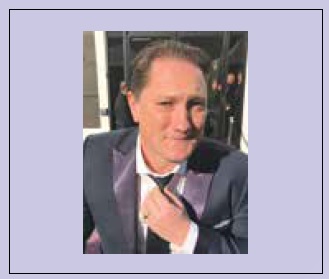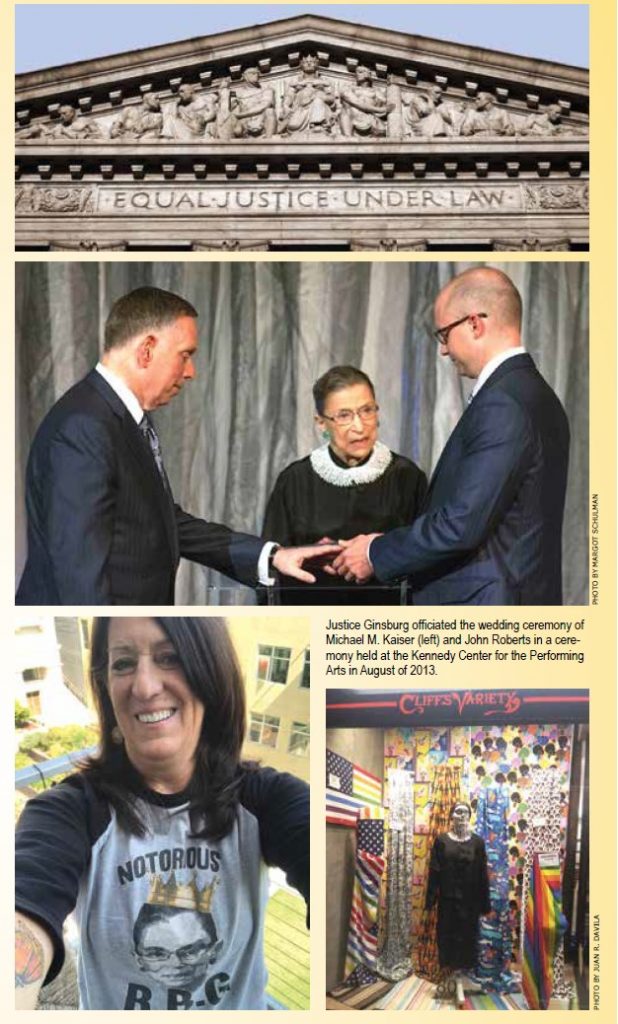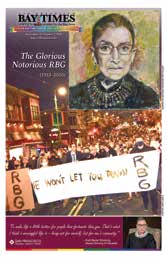

By Liam P. Mayclem–
Tributes continue to pour in from all corners of the world, including here in San Francisco, for Supreme Court Justice, civil rights pioneer, and pop icon Ruth Bader Ginsburg. The tributes have been especially evident in the Castro, where a candlelight vigil was held on the evening of her passing, September 18. A cardboard sign with the letters “RBG” now hangs at the corner of 18th & Castro. At Cliff’s Variety, there is even a window mannequin sporting Associate Justice Ginsburg garb.
To learn more about this remarkable jurist and one of the LGBTQi community’s greatest and most influential allies, I recently spoke with former NCLR Executive Director and fellow San Francisco Bay Times columnist Kate Kendell, who is now the Legal Director for the Southern Poverty Law Center.
Liam Mayclem: When you hear the name Ruth Bader Ginsburg, what comes to mind?
Kate Kendell: She made it possible for women to pursue fields that had previously been closed off to them, and one of those fields was the law. What she contributed to the field of justice around gender, sex equality, the rights of LGBT people, and the rights of immigrants was immense.
Liam Mayclem: Where were you when you heard the sad news, and how did you react to her passing?
Kate Kendell: I was in San Francisco at home and about ready to head to the airport to go to Seattle for a friend’s wedding. A friend called and said, “Have you heard the news?” And then she told me. I just cried out, “NO, NO, NO!” It was like the loss of a family member. Even though I never met Ruth Bader Ginsburg, I felt like I knew her. I was lucky enough to see her in court twice, first for the 2013 challenge to the Defense of Marriage Act, the Edie Windsor case. I taught her cases to multiple classes at law school as an adjunct professor. She felt like someone dear to my life.
Liam Mayclem: What were the landmark decisions she made on the bench that stand out most to you?
Kate Kendell: Well, I want to go to 2013 first, only because it was the very first time I was ever at an argument at the Supreme Court.
So, for me, it was just electrifying to be there. And keep in mind this was not just a challenge to the Defense of Marriage Act to federal DOMA, but it was also a challenge to Prop 8. Both cases were argued that bright spring morning.
I felt the sense of reverence. You know, it really can’t be overstated, and as a lawyer who has seen the court very often vindicate the rights of those who have been dispossessed or oppressed. It was just a tremendous experience when the justices walked out.
There is literally this large bench that’s in a horseshoe shape, where they all sit around. It’s big and it’s imposing. And RBG was a tiny woman, and she was even tinier as she got older. And when she sat down, you could barely see her forehead, but when she spoke, the entire room held their breath wanting to hear what she had to say.
The U.S. solicitor general then, Paul Clement, was defending DOMA and saying that it was perfectly appropriate for couples who have been married by their state to have the right to federal benefits. She said something like, “So, it sounds to me like you’re talking about this thing called full marriage and that gets full benefits, including federal benefits. And then you’re talking about this skimmed milk marriage where you only get state benefits; you don’t get federal benefits.” And, of course, the whole room erupted in laughter. She did that often during an argument. She would just have a quip that would be particularly witty or clever, and I was just so grateful to be in the room. And just to walk in knowing that she was our champion, that she would be on the right side of history and justice.

Liam Mayclem: What did you make of RBG’s last wish that the sitting president does not replace her, and what can we do to honor her and that wish?
Kate Kendell: Her last wish revealed how concerned she was about corruption, party over country, the toxic culture by both the administration and the GOP-led Senate. She was a woman who deeply loved democracy, believed in the rule of law, and believed in the court. And to think she was on death’s door and had to be concerned by this administration and their actions, jamming through yet another unqualified nominee. It’s infuriating to me that she had to have that be her last wish.
On the second part, what I think we need to do as a community who values our democracy, cares about justice, and deeply, deeply loves RBG—we need to do everything we can to stop an unjust nomination from going forward again.
We must win the White House and take back the Senate, based on their complete trashing of every democratic norm. We need to add justices to the court to delude the vote of whoever this horseman of the apocalypse will be. Gorsuch, Kavanaugh, Alito, and Thomas have an ideological bent that cares nothing about the constitution unless it’s in service of their own political and ideological views. That is not who we need on this court.
“San Francisco Bay Times” columnist Kate Kendell is the Legal Director of the Southern Poverty Law Center and the former Executive Director of the National Center for Lesbian Rights (NCLR), a national legal organization committed to advancing the civil and human rights of lesbian, gay, bisexual, and transgender people and their families through litigation, public policy advocacy, and public education. NCLR’s legal, policy, and legislative victories set important precedents that improve the lives of all LGBT people and their families across the country.
Emmy Award-winning radio and television personality Liam Mayclem is regularly featured on KPIX as well as KCBS, where he is the popular Foodie Chap. Born in London, Mayclem is now at home in the Bay Area, where he lives with his husband, photographer Rick Camargo. For more information: https://www.bookliam.com/

“Fight for the things you care about, but do it in a way that will lead others to join you.”
—Ruth Bader Ginsburg (1933–2020)
Supreme Court Justice Ruth Bader Ginsburg was not just an iconic jurist. She was also, as Human Rights Campaign President Alphonso David recently said, a force for good. This was particularly true for the LGBTQ community. She helped to improve our lives through her decisions on numerous landmark cases in our civil rights history over the past three decades. Here are just a few examples:
While we all knew that Ginsburg was well into her senior years and battling cancer for the fifth time, the announcement of her passing on September 18 still came as a heartbreaking shock to many of us. The associate justice was just 5’1″, but seemed larger than life given her mental fortitude and ability over the decades to overcome both personal and professional challenges. A candlelight vigil was quickly organized by local politicians and community leaders in the Castro, where hundreds took to the streets to mourn her passing, honor her legacy, and vow: “We won’t let you down, RBG.”
The photo from the September 18 nighttime vigil was taken by Juan Davila of the San Francisco Bay Times. The portrait of Ginsburg, The Glorious Notorious RBG, is courtesy of the artist, legendary singer Joan Baez, and Seager Gray Gallery.
Baez shared: “Although Ruth Bader Ginsberg outlived herself by far, her death still comes as a seismic shock to this country. What she couldn’t know is that her passing would energize people of all ages and genres and persuasions to strive with renewed purpose for equality and social justice. RBG’s fervent last wish was that she not be replaced until a new president is in office. On November 3, we can help make her dying wish come true. Action is the antidote to despair. VOTE!”
Published on September 24, 2020
Recent Comments